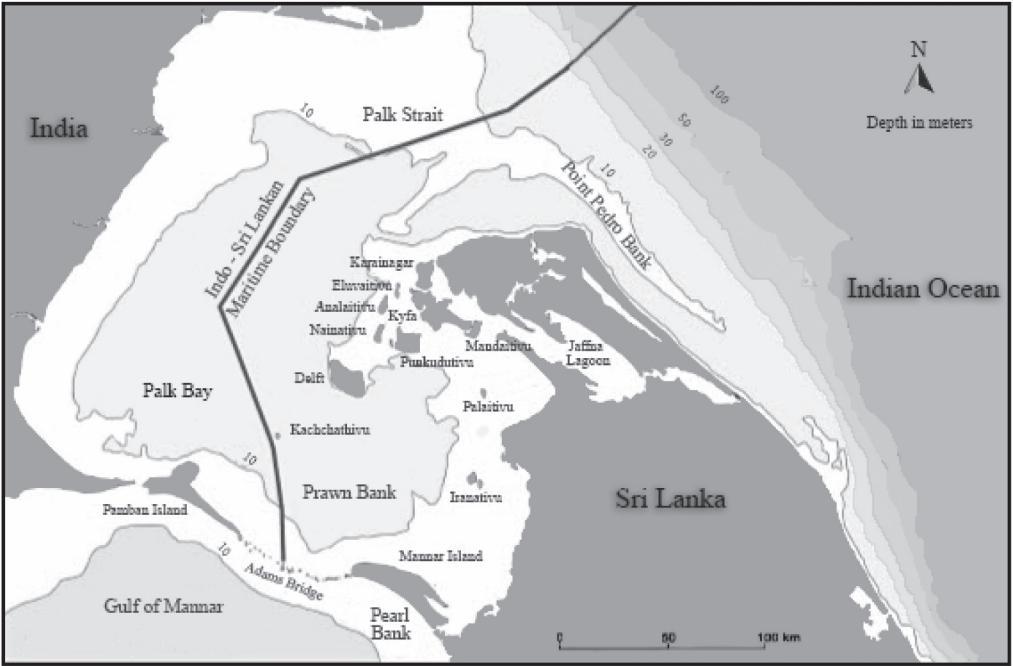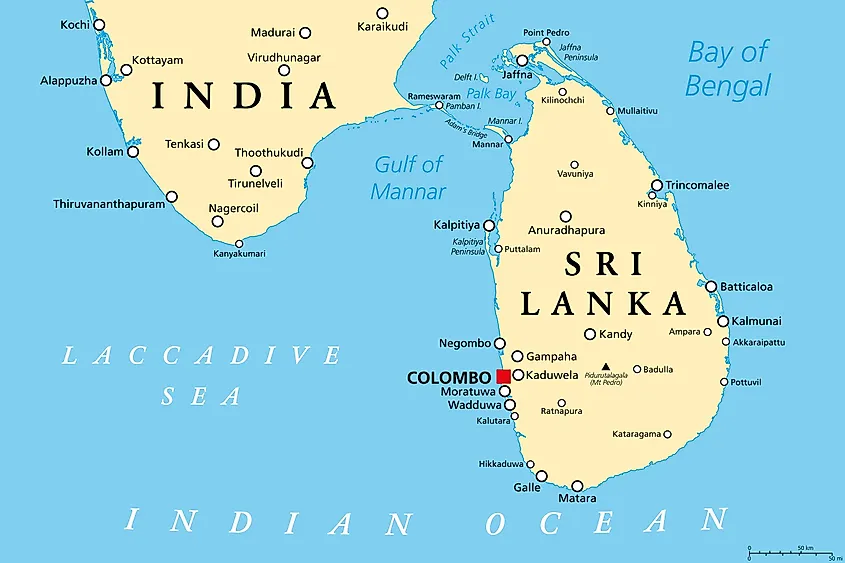International Relations
India-Sri Lanka Fishing Dispute
- 11 Feb 2025
- 9 min read
For Prelims: Palk Bay, International Maritime Boundary Line (IMBL), UN Convention on the Law of the Sea (UNCLOS), Katchatheevu, High Seas, Palk Strait, Seaweed Farming.
For Mains: India-Sri Lanka fishing dispute, its implications and way forward.
Why in News?
The Sri Lankan Navy arrested some Indian fishermen for fishing in Palk Bay (Sri Lankan waters), reigniting the India-Sri Lanka fishing dispute.
- In 2024, Indian fishermen arrested in Sri Lanka crossed 500 for the first time in a decade (2014: 787 arrests).
What are the Key Issues in the India-Sri Lanka Fishing Dispute?
- Recurrent Arrests: Indian fishermen with their trawlers often in search of fishes stray into Sri Lankan waters due to engine failures or sudden weather changes.
- The destruction of fishing vessels, continued boat confiscation after fishermen's release, and heavy fines by Sri Lankan authorities remain recurring issues between both nations.
- Violation of IMBL: Indian fishermen claim historical fishing rights beyond the International Maritime Boundary Line (IMBL) based on traditional practices that lead to arrests of Indian fishermen in areas close to the IMBL.
- The Palk bay is equally divided between India and Sri Lanka by the IMBL, but fishing rights remain contested.
- The IMBL (as per UNCLOS) is an official boundary separating territorial waters, defining maritime jurisdiction, and regulating fishing, resource use, and naval activities.
- Depletion of Fish Stocks: Overfishing on the Indian side of the IMBL forces Indian fishermen into Sri Lankan waters, which Sri Lanka views as “poaching,” posing security risks and threatening local livelihoods.
- Bottom-Trawling: Sri Lanka opposes ecologically destructive bottom trawling employed by Indian fishermen, and seeks a sustainable solution to protect their waters from over-exploitation.
- Bottom trawling drags weighted nets along the seabed, damaging marine habitats like coral reefs and sponges.
- Sri Lanka’s National Security Concerns: Sri Lanka alleges that Indian trawlers intrude regularly in a coordinated manner and fears Tamil militant groups may re-emerge using fishing vessels.
- Katchatheevu Island Dispute: Katchatheevu, a 285-acre islet in the Palk Strait, was ceded to Sri Lanka in 1974.
- Indian fishermen can only use Katchatheevu for drying nets and resting, and Tamil Nadu politicians periodically demand its return to India.
Note: Due to depletion of fisheries stock in Indian and Sri Lankan waters, Indian fishermen are venturing into the High seas. They are now also being arrested in Maldivian waters and by the British Navy near Diego Garcia for allegedly crossing the maritime boundary.
What are International Laws on Freedom of Fishing?
- UN Fish Stocks Agreement (UNFSA, 1995): States should either become members, or they should agree to apply the conservation and management measures established by Regional Fisheries Management Organizations (RFMOs) to access fishery resources.
- RFMOs are international bodies responsible for managing and conserving fish stocks in specific ocean regions.
- UNCLOS, 1982: Article 87 of UNCLOS limits fishing freedom on the high seas, making it illegal for vessels from States that fail to meet its conditions.
- E.g., Considering due regard for the interests of other States in their exercise of the freedom of the high seas.
Palk Bay
- About: Palk Bay is a narrow water body between southern India and northern Sri Lanka, and is rich in biodiversity, due to monsoon-driven nutrient inflow.
- Boundaries: The southern boundary is marked by the Pamban Strait, Rameswaram Island, and Adam’s Bridge (Rama Setu).
- The northeastern boundary is the Palk Strait that connects the Palk Bay to the Bay of Bengal.
- Palk Bay Fishing Conflict: Following the end of the Sri Lankan civil war in 2009, fishing disputes escalated, reaching their peak in 2013 due to overfishing and bottom trawling by Indian fishers.
Click Here to Read: India and Sri Lanka Relations
What are the Implications of Indo-Sri Lanka Fishing Conflict?
- Livelihood Issues: Sri Lanka Navy's arrests of Indian fishers distress their families, while sea conflicts have caused fatalities and missing fishers, heightening risks for fishing communities.
- Enforcement Challenges: The enforcement cost for patrolling the IMBL has risen, straining resources.
- Smuggling Concerns: The Indian Coast Guard and Sri Lanka Navy struggle to differentiate between genuine fishers and smugglers making IMBL vulnerable to smuggling.
- Political Ramifications: Allegations against the Sri Lanka Navy’s actions in the Palk Bay have fueled diplomatic tensions between the two nations.
- E.g., Political tensions have influenced India’s support for UN resolutions on Sri Lanka’s human rights record.
- Environmental Impact: Bottom trawling harms fish breeding, depletes stocks, and damages the seafloor, with recovery taking thousands of years.
- Economic Consequences: Overfishing has reduced fishery resources and fishers' income, with Sri Lanka losing an estimated USD 730 million annually due to Indian poaching.
Way Forward
- Enforcing Maritime Regulations: Enhanced patrolling and surveillance of IMBL can help prevent illegal fishing activities.
- A dedicated Joint Working Group (JWG) should be established to ensure continuous dialogue and problem-solving mechanisms.
- Alternative Livelihood Programs: Tamil Nadu should offer alternative livelihoods like marine tourism, seaweed farming, and inland aquaculture for fishers facing restrictions.
- Joint Marine Resource Management: A regional fisheries management authority should be established to regulate fishing activities and prevent overexploitation of marine ecosystems.
- Sustainable fishing like catch limits and quotas can ensure fish populations recover quickly and release fish fingerlings can compensate for depleting resources.
- Deep-Sea Fishing: The Indian government should enhance funding, training, and incentives to ensure higher adoption of deep-sea fishing by Indian fishers.
|
Drishti Mains Question: Discuss the key issues involved in the Indo-Sri Lanka fishing dispute and suggest measures for a sustainable resolution. |
UPSC Civil Services Examination, Previous Year Questions (PYQs)
Prelims
Q. Consider the following statements: (2020)
- The value of Indo-Sri Lanka trade has consistently increased in the last decade.
- “Textile and textile articles” constitute an important item of trade between India and Bangladesh.
- In the last five years, Nepal has been the largest trading partner of India in South Asia.
Which of the statements given above is/are correct?
(a) 1 and 2 only
(b) 2 only
(c) 3 only
(d) 1, 2 and 3
Ans: (b)
Q. Elephant Pass, sometimes seen in the news, is mentioned in the context of the affairs of which one of the following? (2009)
(a) Bangladesh
(b) India
(c) Nepal
(d) Sri Lanka
Ans: (d)
Mains
Q. ‘India is an age-old friend of Sri Lanka.’ Discuss India's role in the recent crisis in Sri Lanka in the light of the preceding statement. (2022)
Q. In respect of India-Sri Lanka relations, discuss how domestic factors influence foreign policy. (2013)






